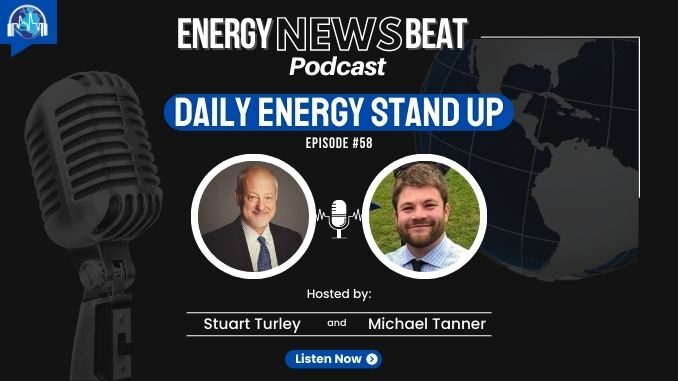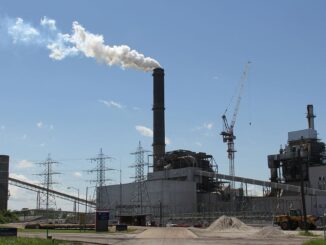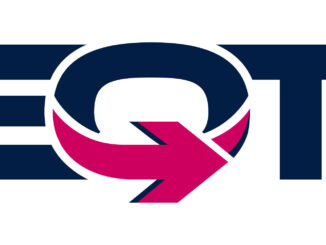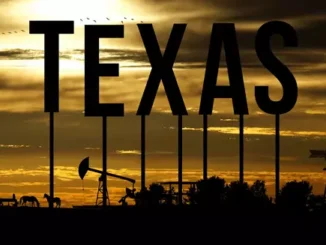
It is Friday; the guys are ready for the weekend after a wild news week. Did the US blow up the Nord Stream pipeline? – Well, Joe said he would “Take care of it” – is that 10% for the big guy true? A shout out to David Blackmon, who called it that the U.S. had more to gain with the Nord Stream demolition!
Highlights of the Podcast
00:00 – Intro
04:02 – Duke Takes 1.3 Billion Charge on Renewable Unit for Sale
08:07 – Coal and natural gas plants will account for 98% of U.S. capacity retirements in 2023
10:39 – U.S. looks to Asia for long term LNG demand
12:54 – How America took out the Nord Stream pipeline
21:28 – Commodity trader Trafigura faces $577 million loss after uncovering nickel fraud
23:28 – ExxonMobil They announced record earnings 56 billion, record profit, 2022
29:07 – Outro
L.A. is shutting down its largest gas plant — and replacing it with an unproven hydrogen project
Hydrogen
The Los Angeles City Council voted unanimously Wednesday to move forward with an $800-million plan to convert the city’s largest gas-fired power plant to green hydrogen — a first-of-its-kind project that was hailed by supporters […]
Commodity Trader Trafigura Faces $577 Million Loss After Uncovering Nickel Fraud
Finance
How America Took Out The Nord Stream Pipeline
Geopolitical
Coal and natural gas plants will account for 98% of U.S. capacity retirements in 2023
Coal
US looks to Asia for long-term LNG demand
Exports
Sponsorships are available or get your own corporate brand produced by Sandstone Media.
David Blackmon LinkedIn
The Crude Truth with Rey Trevino
Rey Trevino LinkedIn
Energy Transition Weekly Conversation
David Blackmon LinkedIn
Irina Slav LinkedIn
Armando Cavanha LinkedIn
Video Transcription edited for grammar. We disavow any errors unless they make us look better or smarter.
Michael Tanner [00:00:07] What is going on. Everybody, welcome into another edition of the Daily Energy News Beat. Standing up here on this gorgeous Friday, February 10th, 2023 is always I’m your humble correspondent, Michael Tanner, coming to you from an undisclosed location here in Dallas, Texas.
Michael Tanner [00:00:24] We appreciate you joining us here today. It’s Friday. You made it. Deep breath. I hope you’ve only got 1 to 2 meetings and you could ditch out early for the weekend. That’s the vibes we’re sending out here on Friday. I am joined, as always, by the executive producer of the show, the premiere, the show and the director, publisher of the world’s greatest website, EnergyNewsBeat.Com Stuart Turley, my man, how are we doing today?
Stuart Turley [00:00:45] It’s building neighborhood. I’m ready for a weekend.
Michael Tanner [00:00:49] Yes. Been a long week still. It’s been a long week. You know, much like our listeners, we’ve been beat down with all this negative news. I think we’ve got some really great stories to highlight, but we hope you guys have had a great week and are geared up for the weekend. Not a tease. Do I think this might be our best show of the week when it comes to stories? I mean, we have some absolute bangers lined up.
Stuart Turley [00:01:09] Oh, yeah. Last night yesterdays was good too, man. It was great.
Michael Tanner [00:01:13] It was a good lineup of stories, I think, this week. So here’s what we’ve got for today. First one, U.S. looks to Asia for long term LNG demand. It’s got to come from somewhere. And so I think it’ll be interesting to see how this LNG market pans out. Stu cover what this article talks about.
Michael Tanner [00:01:29] Next one we have as coal and natural gas plants will account for 98% of U.S. capacity retirements in 2023. Another probably the most depressing story we’ve ran all week. I mean, I’m I, I mean, as much as I love coal, you know, we should probably be canceling our coal plants, but the natural gas plants, I mean, that has just is asinine to me.
Michael Tanner [00:01:50] Next one, how America took out the Nord Stream pipeline. We wouldn’t let you get away on a Friday without a good conspiracy theory, even though, unfortunately, it’s now confirmed with all the data. Stu will cover how we did actually take out the Nord Stream pipeline, which just seems crazy.
Michael Tanner [00:02:06] Next. All this. This is just funny. Duke Energy takes $1.3 billion charge on renewable for unit sale will have all the details on that write down and the tax credit implications on that. He’ll kick it over to me. I’ll cover what’s going on in the oil and gas markets, we did see natural gas prices pop a little bit day due to a fairly bullish natural gas storage drop, crude oil prices hanging out at that 7560 mark.
Michael Tanner [00:02:34] I’ll also talk about two interesting stories. One, commodity trader, Trafigura, looks like they got caught up in some fraud, but old school fraud, very interesting. We’ll cover that. And then ExxonMobile announcing record earnings at then drops two bombs within that release, warn on the consolidation of units, which is going to result in more layoffs and then the launch of a global trading unit, which I think is really interesting and I think goes to viewpoint.
Michael Tanner [00:03:03] We’ve got a lot of thoughts and we’ll cover all of that and a bag of chips, guys. But first, check us out, World’s greatest website, WWW.ENERGYNEWSBEAT.COM. You literally will get smarter the more you go there. I mean, it’s scientifically proven we’re working on getting the FDA approval to get that rolled out.
Michael Tanner [00:03:21] So just wait. Fauci’s on it, guys, don’t worry. But it’s proven out like the vaccine was proven to stop transmission of COVID 19. It’s proven to make you smarter. So take that with take that little tidbit and do with it what you want. But enough of the pleasantries, though, Stu, Where would you like to begin?
Stuart Turley [00:03:43] Well, I’m going to tell you right now, it’s not the radiation coming from my forehead. It makes everybody smarter. So we’ll just stop. Okay. Let’s start with Duke. You know, I love me. Some do, but this one really brings up some stuff that’s just coming around the corner.
Stuart Turley [00:04:00] The title of it is Duke Takes 1.3 Billion Charge on Renewable Unit for Sale. The tagline on it is Duke Energy will take 1.3 billion impairment loss on the sale of its commercial renewable business, which it now expects closed later this year according to its earnings release. Michael, this is kind of like the old tax deduction. You get a tax credit and then you sell it. Oh, where does that go? This brings up.
Michael Tanner [00:04:35] Well, it’s the difference between book value and physical cash. So it’s the state. It’s again, I’m not going to compare Duke Energy and Duke Energy to F.T.X, but that’s what happened with F.T.X. Their balance sheet was balanced because it had all of this coin, which was assigned a value out of thin air. So again, not comparing this, but that’s how these balance sheets work.
Michael Tanner [00:04:58] You have assets and you have to come up with a valuation of those assets and you can devalue the assets as much as you want. And so what they did here when they originally were valuing at 3 to 4 billion, they were including the tax credit, which was paid out over the first year of operation, according to this article.
Michael Tanner [00:05:17] And now all of a sudden they have to write those assets down to their actual level if they were to sell on the market today, because guess what the value the tax credit no longer gives with its associated with. So the tax credit was about one and a half billion dollars or the entire value of the renewable project. It’s absolutely insane to me because they had a book value of 3 to 4 billion. So the tax credit was at least 1.5 billion, maybe more.
Stuart Turley [00:05:45] Right. But it does not make any sense then. How do you get back and say that Soler was even able. I mean, wind was even able to supply.
Michael Tanner [00:05:54] Oh, it’s a it’s a proof. It’s proof, once again, that these things are economical projects due to the tax credits and exactly are there away from the tax benefits of renewables. There’s not much left over in the investment.
Stuart Turley [00:06:10] No, and it is I mean, it just the bottom line is that write offs, generally speaking, are not good, said analyst Paul Patterson of Glenrock Associates. We’re finding that in some of these cases, values in these companies have to hold on their books for these assets is different when they try to go sell them and not in a good way.
Michael Tanner [00:06:32] Absolutely. It’s a downward shift because it’s a downward shift. So this is inevitable with this is I mean, this is inevitable with any project in which big tax credits are associated with it. And yeah, it happens to be renewables fall in that category. So this will be fine.
Michael Tanner [00:06:48] I mean, BP’s BP’s going to do the same thing. They’re just not you know, they’ll BP will do the same thing. With their big solar projects Equinox, I mean, equal or does it, you know, work in the United States? I guess. But I mean, they do a little bit, what am I saying? But all these big renewables companies are probably going to deal with some some version of this this extreme. Who knows? But, you know, if there’s ever a.
Stuart Turley [00:07:13] But this brings up a great point, Michael, and that is ESG investing. So if you have the big ESG investing house houses. And everybody’s thinking that they’re getting a good rate on return, but those rate on returns are actually falsely tied up by the taxes.
Michael Tanner [00:07:33] Yeah, it’s like with the oil and gas industry was doing with growing production and not cash flow. Right. It’s the exact the exact same thing the focus has been on, oh, what’s the value of the asset? And now it’s shifted towards, oh, we have to adjust for these tax credits because they run out after a year, much like everyone realized, Oh, Jamie Lynn Energy’s not actually giving me any money growing production. It just consolidated my stock price, you know what I mean? Like, it’s got clean energy vibes. Ooh, ooh. Not good enough, right?
Stuart Turley [00:08:03] Words did. Okay. Hey, let’s go to the next one here. Coal and natural gas plants will account for 98% of U.S. capacity retirements in 2023.
Michael Tanner [00:08:16] Kill me.
Stuart Turley [00:08:17] I’m going to go on record here in a minute after we finish this coal substantial coal U.S. fired has retired over the last decade. 19 point or excuse me, 14.9 gigawatts was retired in 2015. Annual coal averaged 11 gigawatts per year from 2015 to 2020.
Michael Tanner [00:08:45] Interesting in 2021 decreased to only 5.6 gigawatt year and then increased to 11.5 retired in 2020. That’s interesting.
Stuart Turley [00:08:55] But here’s the thing. Natural gas This year, 6.2 gigawatts of natural gas fired capacity is scheduled to retire, representing 1.3% of the natural gas fleet. There’s a good graphic in here representing where these are thing coming from, but they’re not going to be retiring the petroleum ones because those are really in cold standby. It’s easier to have a cold standby.
Michael Tanner [00:09:29] Crude oil facility.
Stuart Turley [00:09:31] Crude oil facility than it is a coal. So those are not going to be retired.
Michael Tanner [00:09:38] I’d be interesting to see. And here’s my thing, I’m not against retirement. I think things get old and you need to replace them. So the real question is, have these places gone about replacing this baseload energy? You may never know, though.
Michael Tanner [00:09:52] The natural gas you can tell is is is Southern California, Redondo Beach, Huntington Beach and Alamitos. They probably are not getting anything new. Is Ohio probably getting something from natural gas? Yeah, they’re probably switching over to a more modern natural gas facility that’s been expanded out. I mean, we could we could go figure that out but the real question is, what’s it being replaced with?
Stuart Turley [00:10:14] Exactly. But on the other hand, down there and I was looking at California, they get most of their natural gas from Colorado coming in from those fields and across.
Michael Tanner [00:10:28] God bless Colorado.
Stuart Turley [00:10:29] I bless Colorado. But in the northern part of the state, they get it from Canada.
Michael Tanner [00:10:34] Take me home.
Stuart Turley [00:10:37] And. Okay, let’s go back to the next one. Asia is looking to us, looks to Asia for long term contracts to help. Growing LNG capacity in the U.S. requires long term deals rather than short term deals. 27 years is what China just signed with Qatar, what, two weeks ago, three weeks ago.
Stuart Turley [00:11:02] And and so we take a look at this. That’s what it’s going to take to build out some of these facilities. It’s going to happen because LNG is such a great investment. The U.S. has been a deal last minute LNG supplier. But that’s going to get sucked up. All of our take away is going to get sucked up into long term contracts. Won’t that just flatten the price volatility?
Michael Tanner [00:11:35] It probably will. It’s it it means that we think we’re going to have to we’re not going to be able to produce as much here that we consume, which I think is is, is.
Stuart Turley [00:11:52] But, you.
Michael Tanner [00:11:52] Know.
Stuart Turley [00:11:53] For Europe, because Asia increasing so much that it is definitely Canada is. What this article is telling me is Canada is missing the boat because the LNG market to Asia would be phenomenally out of British Columbia. They could just they could crush it.
Michael Tanner [00:12:19] But I mean, we’ll take it. We’ve got enough LNG to export. I mean, we could use it right now at these prices. I build as many LNG export facilities as we need to get it as much as we can to get these prices up quick. We get one done in three months. Is that possible? Can we get a can we get a an LNG export facility done in three months? Regasification in six.
Stuart Turley [00:12:39] I just did a with Nick. I’ll cover that here in a little bit.
Michael Tanner [00:12:46] But what do we got next?
Stuart Turley [00:12:48] Okay.
Michael Tanner [00:12:51] And I think we got your conspiracy. We’ve got how America took out the Nord Stream pipeline. Let’s break this down for you. What’s this article saying?
Stuart Turley [00:13:00] Okay. This article, there’s about four or five videos out there. And and this one really was the best that I found that Putin said there when when it happened, there was a real question. The article stated how America took out the Nord Stream pipeline, Nord Stream one and Nord Stream two, or actually a set of four pipelines that come from Russia to Germany that goes under the Baltic Sea.
Stuart Turley [00:13:32] And in the Baltic Sea. The the map shows where these things were blown up. Three of the four. Again, there’s two pipelines, but there’s actually four in the group. Three of the four are blown up. And it was Nord Stream one. Let’s go to this part here.
Stuart Turley [00:13:58] This is a false and complete fiction. Tammy Thorp, spokesperson for the CIA. Right. Said this claim is completely and utterly false. Where it is in the data here, they say that in this document that all of the planning took place, they brought in there’s two different diving teams. Everybody thought, oh, it’s got to be Navy SEALs. No, it’s the deep diving group out of Annapolis. Annapolis, which is a different group.
Stuart Turley [00:14:34] They were then carried out to Norway. Norway has a very large U.S. military base there. And then they bring them in from Norway and they dropped them in. And so when they were getting ready to drop them in, they were also saying that they were diving down, putting the C4 explosives on it. And then Biden said that he wanted to go through and have it be able to remote detonate at a certain time.
Stuart Turley [00:15:07] So the CIA then had to go back and redo the detonation devices. The detonation devices were then come up with sound boogies. So when a sound boom would drop off, it would pick it up in a code and they would only have to drop off the sound boy. There was a big war games going on. So they wanted to make sure that they did not get blown up during that war game in that area.
Stuart Turley [00:15:39] So they did all this. They made it then. And I have to hand a shout out to David Blackman. He said it was probably the United States months ago and it was because there’s only two countries that could really pull this off, Russia or the United States.
Stuart Turley [00:15:57] And if Russia did it, they would have to come up through the Black Sea all the way around, through the Strait of Gibraltar, back up around, and then Putin actually said it best. Why would I want to blow it up when I got one end of it in my country? Mm hmm.
Stuart Turley [00:16:16] So this whole thing being said, Michael, it’s very detailed, very laid out. And we had to have been based out of Norway in order to get this done. I found that the most important part of it. And then when you sit back and look at it, it does make a lot of sense. Hey,.
Michael Tanner [00:16:36] We’ll. Trust we’ll trust the random dude on Substack. We’ll trust the random dude on Substack.
Stuart Turley [00:16:41] Hang on now. Biden on this random dude on Substack even said he would take it out in the.
Michael Tanner [00:16:47] I know Biden said he would take it out. So here’s the thing. I don’t know who this author is. He’s got like an established like substack author. Who is this guy?
Stuart Turley [00:16:56] I don’t know. But everything in there checked out from four or five other places.
Michael Tanner [00:17:00] Okay. Okay. The only reason I even slightly believe this is because Biden did literally say with his own mouth. We’re going to take it out. Right. I mean, literally, he said so. This, this, this this article reads like a Tom Clancy novel.
Stuart Turley [00:17:17] It’s so. But, you.
Michael Tanner [00:17:19] Know, you know.
Stuart Turley [00:17:20] You’re fighting all these other different sources. And this is a one of the best articulations of what could have happened. I will say that.
Michael Tanner [00:17:31] Good. You’re right. You’re right. Could all random dude on Substack Scott it. So we’re good?
Stuart Turley [00:17:37] Oh, absolutely.
Michael Tanner [00:17:38] And so people say about you some random dude on substack. That’s how you.
Stuart Turley [00:17:42] Being a random dude.
Michael Tanner [00:17:44] You got anything else?
Stuart Turley [00:17:46] Yeah. L.A., there’s one thing here that you got to read here. L.A. is shutting down its natural largest gas plant and replacing it with an unproven hydrogen project. This one goes in with that other story that we were just talking about with natural gas in California. It’s kind of funny.
Stuart Turley [00:18:07] They were coming in here and the city’s ultimate goal is burning 100% green hydrogen. If they’re sitting there saying that natural gas in the homes needs to go away, hydrogen’s not going to replace it because pipes leak even more. So we’re not going to be going there anytime soon. It just means more higher prices. All right.
Michael Tanner [00:18:33] That’s fine. All right, That’s fine.
Stuart Turley [00:18:35] That’s all I got to say.
Michael Tanner [00:18:38] All right. Well, we appreciate it, guys. We’ll get you out of here fairly quickly. But I actually do have a decently long finance section. Crude oil prices quickly currently trading 77, 65. Time stands here about 6:50 p.m., actually on the ninth, the night before, as we Record.
Michael Tanner [00:18:57] Not much really that we saw. You know, you you Google and you hear what Reuters has to tell you they’ll claim it was because some earthquakes and choppiness. I mean, again, we’re just in a fight, but we’re just really in a fight between the supply and demand side. And really what’s going on with the dollar.
Michael Tanner [00:19:12] I think, is, as you know, what you saw with the overall markets today, S&P 500 drops about a 10th of a percentage point 9/10 of a percentage point for the Nasdaq. Dollar does dollar weakens again off global recession refers that’s going to, you know pullback. You know again we’re still at 77-65 so nothing to be too terribly concerned about.
Michael Tanner [00:19:32] But we’re going to see some sharp but it’s not just going to be bulbul bobble gains gains gains gains gains. 120 mean we may not get above 80 $82 in this run. We may be it may be the peak of this sort of peaks and valleys. So again, it’s going to be fascinating and we will make sure to cover everything that’s going on with crude oil prices, natural gas. It was up then. It was it was down, then it was up.
Michael Tanner [00:19:54] You know, really it was down off a little bit of a warmer weather outlook but then we did get the E.I.A storage and injection numbers. We had a draw of 217 B.C.F last year. We get 228 and that 217 fell basically at the higher end of the range of expectations that analysts had between 187 and 212. So a little bit over giving a little bit bullishness to to gas prices currently trading $2.45. Again as we record this the night before at about 652. So,.
Michael Tanner [00:20:28] You know, again, I think growing surpluses next month is really what’s on the horizon. Freeport has mentioned that they’re going to start and scheduled their next one of their first deliveries. I saw that just dropped this afternoon. So, you know, here in a month or two will be able to start seeing all that gas get off. So, you know, I think there is some bullish signs in the future. I was talking to some guy at the office. He’s all in on natural gas call options. So we don’t give we don’t give advice here.
Michael Tanner [00:20:57] But rumor on the street is people are making moves that way. So it would be interesting, you know, fool me once, shame on me, fool me twice, shame on you. So I’m out on taking a stance on natural gas. I’m good, you know. Go. I’ve already had to fight Goldman Sachs off. They’re trying to hire me now more than ever, just because of my bullish stance I had on natural gas. So I will take that one in the shed.
Michael Tanner [00:21:19] There’s just a couple quick stories I want to cover. One, this is this is hilarious. Okay. Article you find again ENERGYNEWSBEAT.COM World’s greatest website Commodity trader Trafigura faces $577 million loss after uncovering nickel fraud. Okay. And you know, global commodity trader trader Trafigura Group is facing more than a half billion dollar in losses after discovering metal cargoes it bought. Didn’t contain the nickel they were supposed to. Yes, people you heard that right.
Michael Tanner [00:21:52] They did not get caught in some financial trading scheme. There was no undercover Mossad agent. There was no private island in Geoffrey ABS. This was literally traders discovered nickel cargoes that didn’t contain nickel. I mean, they said that the article goes on to say Stew Trafigura has spent the past two months uncovering what it believes is a systematic fraud. Against that it has started legal action against Indian businessman Parekh Gupta and several companies connected.
Michael Tanner [00:22:22] The missing nickel is a blow to the company. But where does it say, like legitimately, the traders nickel trade began to unravel when Trafigura investigators arrived at the Port of Rotterdam just before Christmas to check on the contents of the container that were meant to hold nickel. When they cracked it open, it was full of the much of much lower value materials. Literally, the nickel just wasn’t there. So,.
Michael Tanner [00:22:43] I mean, this was this was just a open and shut fraud case. It’s unbelievable. And it’s pretty crazy. That’s how the lot one of the largest I mean, they’re up there with the Glencore of the world. They’re up there with, you know, all of the big players and they they don’t even check the metal they’re getting.
Stuart Turley [00:23:02] No. Somebody should be fired on their own.
Michael Tanner [00:23:05] Oh, they did. They did. The next the second bullet point is nickel and cobalt head. Socrates Economou is leaving the company. Hmm. I wonder why.
Stuart Turley [00:23:14] Yeah. He’s going to go work at.
Michael Tanner [00:23:18] Enforcement. Next year, they’ll work at Goldman Sachs. But I think the only other thing it’d be interesting is, is ExxonMobil. They announced record earnings. You know, but really the their net profit, 56 billion, which was a record, was really cast a shadow by two major announcements that they made along with this.
Michael Tanner [00:23:42] So remember top headline, 56 billion record profit, 2022. Next line ExxonMobil then says. In its move to cut costs annually $9 billion from 20 by 2023 from it were supposed to do theirs was to cut 9 billion from 2019 levels by 2023. Interesting. After posting red for profits and their merging business units and in that process they’re going to be reducing their workforce from a little bit above 70,000 down to 63,000.
Michael Tanner [00:24:18] So in a time of record profits, we’re going to lay people off. I mean, you almost have to admire the savage genius of it. I mean, you know, most of these companies are going with share buybacks and, oh, we’re handing out cash to investors. Excellence is no, we’re laying people off record profits. No. Trim the fat. I mean, you used to work at IBM. This smells of IBM now.
Stuart Turley [00:24:42] Intel.
Michael Tanner [00:24:43] Intel, whatever.
Stuart Turley [00:24:44] Oh, yeah, it does. I mean, they they fired the bottom 10% every single year.
Michael Tanner [00:24:50] Like clockwork, even with record profits. I mean, I mean, you know, back in the heyday, admired a little bit. It’s savage.
Stuart Turley [00:24:58] It is brutal. But, boy, you ought to see people claw on their neighbor and their coworker to not be on that bottom 10%.
Michael Tanner [00:25:07] Oh, of course, because you’re getting ranked every single day in that type of system. And then the second interesting thing is that a part of this consolidation, they’re going to be launching a global trading unit, which they’ve done one of the big super majors that haven’t had it.
Michael Tanner [00:25:21] I mean, to be honest, it’s a great idea if you’re an integrated oil and gas, if you’re an integrated oil and gas company where you have midstream and downstream and upstream, it makes sense to have your own in-house trading unit so you can execute your own hedges. You can do keep that all in-house. You can better vertically integrate and start to trade with yourself on a physical basis. And you actually make some money because you are keen into the market.
Michael Tanner [00:25:50] I mean, the one thing that BP why does BP have like one of the world’s most well-respected well-renowned trading houses? Because they have all the data is pretty easy when you can have a map of the world and you have your it’s your own proprietary data flowing in with the ability to buy every other data set out there. And, you know, literally having your fingers on the scale, that’s what Exxon is going to be able to do when they roll this out.
Michael Tanner [00:26:15] And I think I think it’s going to be a key move. It’s very interesting that they’re just now doing this, but that’ll be a fun job. I you know, watch out, you guys take it. You guys hiring? They don’t need a bull like me, unfortunately. Unfortunate. I’d be too, but I should be buying call option.
Michael Tanner [00:26:32] I want to be on their proprietary team. I hope they have. I hope they have a small proprietary trading team where it’s all just gambling. It’s all just guys in a room, bunch of cigarets and Red Bull coffee and they’re just. And they’re just boom screens everywhere. Hair, zebra. That’s what I hope. And if that if you’re if that’s the team I want to be.
Stuart Turley [00:26:56] You would be fabulous in that chair.
Michael Tanner [00:26:58] You know, it’s like old school. You just got like type. You got typewriters in there. You’re calling in trades to somebody. You know, phones flying everywhere. It’d be great. It’d be great. So if that jobs available, let me know. Otherwise, unfortunately, I’ll stick it out here and. And just keep everybody abreast from the outside. So do I think this was a great Friday show? What else do these people need to know before they start their weekend? Or we bought them enough?
Stuart Turley [00:27:23] Oh, I don’t think we did. I’d just like to thank all of our listeners. We’re getting some fabulous feedback. We appreciate everybody. Check us out on the energy news B at substack dot com and.
Michael Tanner [00:27:37] Rant about substack. That’s us.
Stuart Turley [00:27:39] Random guy on Substack Love me some substack follow.
Michael Tanner [00:27:42] Substack But I do. I have to say my one beef with Substack is now anybody can just start a substack and now they’re newsworthy like it should be. You know what I mean? Like I could write a I can start writing a fake fitness blog and then go, but it’s on Substack so it’s real, you know what I mean?
Stuart Turley [00:28:02] You have.
Michael Tanner [00:28:03] Created a little bit.
Stuart Turley [00:28:04] You know, Substack has done a great job marketing their platform in in, in saying that, Oh, he’s on Substack. Tucker Carlson introduced a guy and said, Oh, he’s a he’s a substack guy.
Michael Tanner [00:28:19] Then I agree. I’m not saying that. But that’s like saying anybody with a Twitter account should be famous. Like, is this guy verified? Like, that’s what I want to know. That’s what Substack needs to roll out is like a verification of data.
Stuart Turley [00:28:31] In about 16 different place
Michael Tanner [00:28:33] I’m not talking about this guy specifically. I’m just saying in general we are the random guy on substack, but that’s fine. But you know, to get back to Stu’s point, yes, we really appreciate the feedback. I hear you loud and clear. We’re trying our levelheaded best to replace Stu, but the interviews aren’t going great. We can’t find anybody. So I have we hear the feedback and we keep working on it.
Michael Tanner [00:28:54] But with that, guys, we’ll let you get out of here, get back to work, and hopefully finish early and start your weekend. If you’re one of the many oil and gas service workers linemen, then the electricity in the electrical business or any type of service worker that’s got to work this weekend. God bless. But with that, it’s the weekend guy. Stuart Turley. I’m Michael Tanner. We got folks. See you Monday, maybe.







